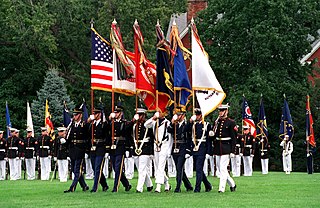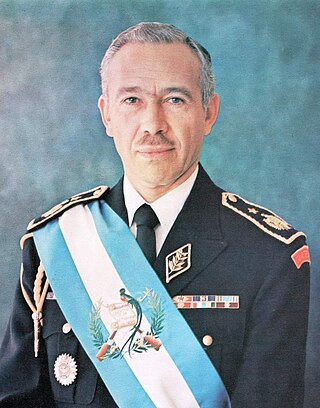
The National War College (NWC) of the United States is a school in the National Defense University. It is housed in Roosevelt Hall on Fort Lesley J. McNair, Washington, D.C., the third-oldest Army post still active.

The Armed Forces of the Philippines (AFP) are the military forces of the Philippines. It consists of three main service branches; the Army, the Air Force, and the Navy. The President of the Philippines is the Commander-in-Chief of the AFP and forms military policy with the Department of National Defense, an executive department acting as the principal organ by which military policy is carried out, while the Chief of Staff of the Armed Forces of the Philippines serves as the overall commander and the highest-ranking officer in the AFP.

The Bolivarian National Armed Forces of Venezuela are controlled by the Commander-in-Chief and the Minister of Defense. In addition to the army, navy, and air force there is also a national guard and national militia primarily focused on internal security.

The United States Army Command and General Staff College at Fort Leavenworth, Kansas, is a graduate school for United States Army and sister service officers, interagency representatives, and international military officers. The college was established in 1881 by William Tecumseh Sherman as the School of Application for Infantry and Cavalry, a training school for infantry and cavalry officers. In 1907 it changed its title to the School of the Line. The curriculum expanded throughout World War I, World War II, the Korean War, and the Vietnam War and continues to adapt to include lessons learned from current conflicts.

The several branches of the United States Armed Forces are represented by flags. Within the U.S. military, various flags fly on various occasions, and on various ships, bases, camps, and military academies.

The White House Fellows program is a non-partisan fellowship established via Executive Order 11183 by President Lyndon B. Johnson in October 1964. The fellowship is one of the United States' most prestigious programs for leadership and public service, offering exceptional US citizens first-hand experience working at the highest levels of the federal government. The fellowship was founded based upon a suggestion from John W. Gardner, then the president of Carnegie Corporation and later the sixth secretary of health, education, and welfare.

The Naval War College is the staff college and "Home of Thought" for the United States Navy at Naval Station Newport in Newport, Rhode Island. The NWC educates and develops leaders, supports defining the future Navy and associated roles and missions, supports combat readiness, and strengthens global maritime partnerships.

Kjell Eugenio Laugerud García was a Guatemalan military officer who served as the 36th president of Guatemala from 1974 until 1978. A member of the National Liberation Movement, he previously served as General Staff of the Army from 1970 to 1972 and Minister of national defence from 1972 to 1973 under President Carlos Arana Osorio.

The Naval Postgraduate School (NPS) is a public graduate school operated by the United States Navy and located in Monterey, California.

William A. Navas Jr. is a retired United States Army major general who served as the director of the Army National Guard. He is also the first Puerto Rican to be named an Assistant Secretary of the Navy.

The Inter-American Defense Board (IADB) is an international defense institution of the Organization of American States, headquartered in Washington, D.C.. The IADB is an international committee of nationally appointed defense officials who develop collaborative approaches on common defense and security issues facing countries in North, Central, and South America.
In the United States Armed Forces, a lieutenant general is a three-star general officer in the United States Army, Marine Corps, Air Force, and Space Force.

Fort Sam Houston National Cemetery is a United States National Cemetery in San Antonio, Texas. Administered by the United States Department of Veterans Affairs, it encompasses 154.7 acres (62.6 ha), and as of 2014, had over 144,000 interments. The cemetery was listed on the National Register of Historic Places in 2016.
The Cuban Revolution was the overthrow of Fulgencio Batista's regime by the 26th of July Movement and the establishment of a new Cuban government led by Fidel Castro in 1959.

Bilateral relations between the various countries of Latin America and the United States of America have been multifaceted and complex, at times defined by strong regional cooperation and at others filled with economic and political tension and rivalry. Although relations between the U.S. government and most of Latin America were limited prior to the late 1800s, for most of the past century, the United States has unofficially regarded parts of Latin America as within its sphere of influence, and for much of the Cold War (1947–1991), vied with the Soviet Union.

The Specially Designated Nationals and Blocked Persons List, also known as the SDN List, is a United States government sanctions/embargo measure targeting U.S.-designated terrorists, officials and beneficiaries of certain authoritarian regimes, and international criminals. The list is managed by the U.S. Treasury’s Office of Foreign Assets Control (OFAC). When individuals are added to the list of Specially Designated Nationals (SDN), their U.S. assets are blocked. Moreover, their names are added to automated screening systems used by banks in the United States and many foreign countries, making it difficult for them to open or hold accounts, transfer money, or transact properties internationally. Any individual or entity that provides support related to terrorism, drug trafficking or unauthorized military use to any person or entity appearing on the SDN list risks being penalized under the USA PATRIOT Act.
The order of precedence in Guatemala is a symbolic hierarchy of officials used to direct protocol. It is regulated by Presidential Decree 07-2003 of March 11, 2003. signed by then President Alfonso Portillo, President of the Congress Efraín Ríos Montt and Former Interior Minister José Adolfo Reyes Calderón.















